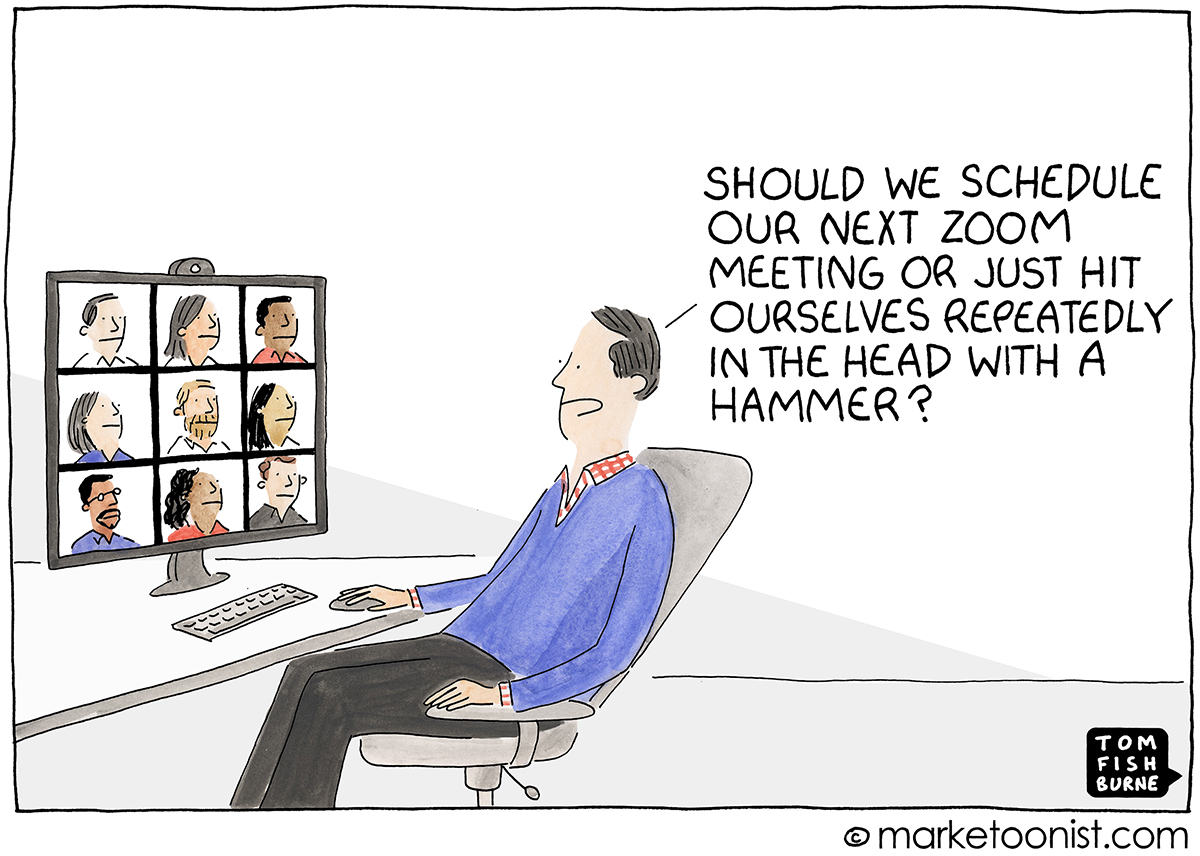Full Research Report: The Impact of COVID on Marketing
To understand COVID's impact on marketing teams, we surveyed 200+ senior marketing leaders. Here's what we found.

The COVID-19 pandemic hasn’t just changed the way we eat, shop, socialize, parent, go to school, or look at toilet paper (as if that wasn’t enough)—it’s also fundamentally changed the way our marketing teams work.
To better understand the dynamic marketing team climate, we commissioned a survey of 200+ senior marketing leaders at over 100 global enterprise-level organizations. Our research aimed to quantify the pandemic’s impact on marketing channels, technology adoption, and individual marketers.
“As marketers, many of us have directly felt (and intuitively understood) the impact COVID has had on our jobs over the last 12+ months,” says Matt Malanga, CMO of Optimizely Content Marketing Platform. “But what was eye-opening about this research are the unforeseen headwinds that this pandemic has introduced. It’s important for marketing leaders to recognize these challenges may run deeper than we thought and could have a potentially lasting impact as it relates to how their teams will execute in the longer term.”
Our research showed marketing spend heading in new directions, shifting digital tactics, marketers needing a bit more TLC, and more.
Below, we’ve compiled our survey results and provided commentary to help you take action.
Marketing Teams Need Help
Yes, the COVID-19 pandemic has been brutal on the worldwide business economy, but it’s been even harder on the backs of those supporting it. Marketers are struggling in key areas, but (fortunately) most of the issues are preventable.
65% of marketers say “frequently shifting priorities” are their top challenge. That’s not hard to imagine. With everyone facing new challenges every day, 2020 seemed like a never-ending pivot.
However, with everything that’s going on, the top problem for marketers shouldn’t be shifting priorities. Communicate and adopt collaborative marketing tools that keep everyone in the loop—this will help prevent your teams from feeling blindsided by evolving demands.
While only 24% of marketers say sharing marketing plans is now more challenging, that’s still close to a quarter of your team who’s struggling to communicate strategies. That struggling percentile is bound to impact the entire marketing department, so it can’t be forgotten.
A large percent of this challenged group is likely finding it difficult to collaborate in a new remote world—but our research shows remote work could be around for a while.
Remote Work Isn’t Going Anywhere Anytime Soon
Remote work was on the rise before COVID-19 hit, but the pandemic has been an unprecedented catalyst in pushing the movement forward. Much of the workforce went full-on remote in 2020, and our research suggests the new work-from-home trend could continue.
84% of respondents believe that the majority of their workforce will continue working remotely through 2021—and that bearing is bound to extend into 2022. Remote work may be the norm for the foreseeable future and that means marketing departments need to quit patching remote issues with band-aids.
Yes, there’s a light at the end of the tunnel—but it’s still difficult to know how long the tunnel goes.
Managing remote employees can be a nightmare without the right tools and strategies. Many marketing teams have struggled to adapt general-use cloud tools like G-Suite, Slack, and Monday.com to work for their more nuanced marketing processes.
Marketing departments need to invest in remote-friendly collaborative tools that’ll last as a long-term, end-all-be-all solution. And our survey shows that’s exactly what marketers are doing.
Resource Management Is Getting Much-Needed Attention
Our research shows that 11% of marketers reported incremental investments in resource management tools, and a more surprising 44% noted increased investment in collaboration and workflow tools.
Why the investment in resource management tools? Think about it.
Imagine your creative team working together in a completely remote fashion. They collaborate with individuals and pass files through emails and Slack messages, but ongoing remote work can cause a few hiccups in the long-term process.
For example, what happens when one of your lead designers leaves? Do their creative assets get lost in cyberspace? Or is there a clunky cloud-based folder that your marketing department can access to dig for assets?
That’s where resource management tools come in handy. They provide an easy-to-manage and easy-to-search-through repository to help marketers quickly find the creative files they need.
Collaboration and Workflow Tools Are Becoming Must-Haves
We knew marketing teams were increasing their investments in collaboration and workflow tools, but even we were surprised to find that number as high as 44%. Yet, it makes sense.
Thanks to remote work, it’s not quite as easy to catch up on the latest campaign developments at lunch or tap a teammate’s shoulder for a quick update. Sure, you could smoosh several meetings into everyone’s already meeting-heavy calendar, but there are better ways to keep your marketing teams in the loop.
Without collaboration workflow tools, marketing processes get interrupted, often at the detriment of your timelines and budgets. To keep everyone aligned and in sync (regardless of where they are in the world), marketing teams need to adopt technology purpose-built for marketers.
Digital Tactics Keep Getting Better and Better
Everyone is spending more time online these days, and marketers are refining their tactics to capitalize.
Nearly two-thirds (64%+) of survey respondents reported social, email, and content channels are on the rise (which is about a 10% improvement over pre-Covid performance).
However, this number is bound to plateau (and even decline) for businesses that get complacent. As enterprises invest more marketing budget into these channels, the cost per campaign will escalate—there’s still only a finite amount of digital real estate. Supply and demand.
Teams will need to continue to monitor and optimize their marketing tactics to drive ROI. Processes will need to improve, and attribution models will need to become more accurate.
Unsurprisingly, 74% of respondents say field marketing and events have been the worst-performing channels. We expect those channels to continue underperforming in the near future, but watch for these teams to adapt to more digital-friendly events and marketing tactics.
Don’t Forget the Individuals Behind the Numbers
It’s easy to get lost in the statistics, but there are real people behind the numbers—and they’re hurting. COVID-19 has impacted people on a personal and professional level, and it showed in our survey.
More than 61% of marketers say their stress levels and work-life balance have gotten worse. With everything that’s happened in the last 12 months (pandemic, elections, civil unrest, natural disaster, etc.), it’s no surprise that people are stressed out—but the work-life balance should be helping, not hurting.
Optimizely Content Marketing Platform’s marketing platform gives managers key insights into employee workloads and performance. They can monitor and manage real-time capacity to ensure no employee has too much on their plate.
Because in the end, what marketers care most about right now is not strategic, higher-order priorities. Instead, close to 50% responded with job security and purpose as answers to “What is keeping you up at night in your role?”
However, there is a silver lining to work during the pandemic. While teams have physically distanced themselves, they’ve socially grown closer. Around 28% of respondents say the “sense of trust among team” has grown—an investment in collaborative tools that encourage better communications makes this trust possible.
Optimizely Content Marketing Platform Helps Mitigate the Impact of COVID on Marketing
While the impacts of COVID-19 are unavoidable, they can be mitigated—and that’s where Optimizely Content Marketing Platform helps. Our cloud-based marketing orchestration platform helps businesses strategically align teams, take the friction out of execution, and demonstrate meaningful results.
Teams struggling with shifting priorities? Keep everyone on the page with Optimizely Content Marketing Platform’s integrated goal planning and calendaring. Don’t have the budget to buy project management, budgeting, asset management, and capacity planning tools? With Optimizely Content Marketing Platform, you don’t have to—we have everything you need on one convenient, cohesive platform.
Optimizely Content Marketing Platform offers the only platform purpose-built for modern marketers and their complexities. It provides a new layer of the marketing tech stack that creates a one-stop-shop for marketers to connect all their martech tools:
- Calendars
- Planning and Budgeting
- Intake and Workflows
- Digital Asset Management
- Project Management
- Analytics
- Creative Development
- Publishing
- And More
